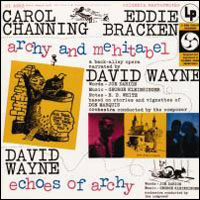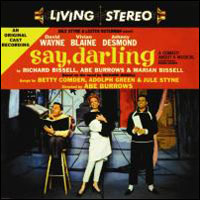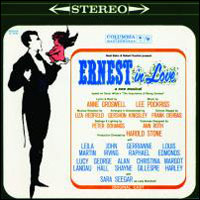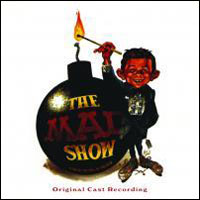
*
A Minister's Wife [PS Classics PS-1102]
The opening tracks of the cast recording of Joshua Schmidt and Jan Levy Tranen's A Minister's Wife made me wonder whether I was perhaps too hasty in my judgment when I viewed it at the Lincoln Center Theater's Mitzi Newhouse in May. But within ten minutes I determined that no, what I found distracting then remains problematic. Which is to say that this is an interesting work and an intriguing experiment, but one in which the authors choose a path which proves unprofitable.
The problem, it seems, is conceptual. Here, on the page, is Bernard Shaw's 1898 Candida, which has retained interest for more than a century. And here, on the stage, is a musical Candida; not so much adapted for the stage, as Alan Lerner and Fritz Loewe did to Pygmalion 55 years ago, as literally set to music. That is, entire sections of Shaw's dialogue are set to music. Mr. Shaw was himself a critic, and I expect he would offer that his dialogue works better without the addition of rhythmic strictures and musical tones.
Under ordinary circumstances, I would simply dismiss the thing and let it rest. The Off-Broadway annals are full of mild-to-weak classics-set-to-music, a form that was especially prevalent in the early 1960s. But A Minister's Wife comes from Joshua Schmidt, who a few years back applied a similar treatment to another old play and turned it into the fascinating and effective Adding Machine. One cannot, and should not, expect so-called lightning to strike twice.
But Adding Machine was so invigorating that A Minister's Wife — which originated at the Writers' Theatre in Glencoe, IL — arrived with high expectations and an abundance of critical good will. The former paired Elmer Rice's expressionistic play (and expressionistic language) with Schmidt's often abrasively unmelodic music to great effect, giving us a musical unlike any other. The language of Candida, though, is decidedly not abrasive; simplistically, I suppose we could say that Rice's dialogue is staccato, while Shaw needs to be legato. (Schmidt wrote music and shared libretto credit with Jason Loewith for Adding Machine. For A Minister's Wife, he wrote music, to lyrics by Tranen.) A Minister's Wife is impeccably performed by Marc Kudisch, Kate Fry and Bobby Steggert, assisted by Drew Gehling and Kate Fry; they have a lot of singing to do, and they do it well. They are ably accompanied by a four-piece band — piano, violin, cello and bass clarinet — conducted by Richard Carsey and orchestrated by the composer. But the problem continually intrudes: A Minister's Wife is Shaw set to music, rather than adapted to the musical stage.
| |
 |
|
| Cover art for archy and mehitabel |
While the piece is a mere 27 minutes, archy and mehitabel has all the trappings of musical comedy. So much so that some fool producer tried to dress mehitabel up and fill her out and turn her into a full-scale Broadway musical in 1957. Shinbone Alley it was called, with a book by one Mel Brooks; Bracken repeated his role, while Eartha Kitt stepped into Carol's paws. Six weeks at the Broadway and out, in the season of Li'l Abner and Bells Are Ringing.
archy and mehitabel is unusual, sure, but it is a hot jazz delight. The CD includes the follow-up echoes of archie, with Wayne alone, which isn't quite up to the earlier piece. Also included is Saint-Saen's "Carnival of the Animals," narrated by Noel Coward. If you want a treat— or a surprise, anyway — go to masterworksbroadway.com, search for archy and mehitabel, and scroll to the bottom of the listing where you will find two photos that you will want to click to enlarge.
| |
 |
|
| Cover art for Say, Darling |
| |
 |
|
| Cover art for Ernest in Love |
It has taken me years to warm to Ernest in Love; I heretofore have grown restless by the tendency to borrow a brilliant speech from Wilde and belabor the issue by singing about it for three minutes. (The notion of Mr. Bunbury goes on and on, as does all that stuff about the hero being left in a handbag in a railway station.) Listening to the new release, though, I have begun to overlook the several lapses — including a clumsy opening number sung by a chorus who seem to thereafter disappear — in favor of the several charms of the affair. These include a handful of songs which I quite enjoy ("The Hat," "Perfection," "A Wicked Man," "You Can't Make Love"). Plus a rather dazzling overture, which brings us to mention the bright and colorful orchestrations. The band is surely expanded from what they used at the Gramercy Arts, and I'm curious to know who did these vibrant recording charts. Gershon Kingsley, arranger of the stage version, is listed in the credits; a good musician, yes, but the album sounds mighty accomplished for someone who did not pursue a career as orchestrator.
| |
 |
|
| Cover art for The Mad Show |
Other new releases from Masterworks Broadway include Gretchen Cryer and Nancy Ford's 1967 anti-war musical Now Is the Time for All Good Men, which played four months at the de Lys; and the "40th Anniversary Celebration Godspell," a two-CD set combining the original 1971 Off-Broadway cast album and the soundtrack of the 1973 motion picture version.
(Steven Suskin is author of the recently released updated and expanded Fourth Edition of "Show Tunes" as well as "The Sound of Broadway Music: A Book of Orchestrators and Orchestrations," "Second Act Trouble" and the "Opening Night on Broadway" books. He also pens Playbill.com's Book Shelf and DVD Shelf columns. He can be reached at [email protected].)
Visit PlaybillStore.com to view theatre-related recordings for sale.









